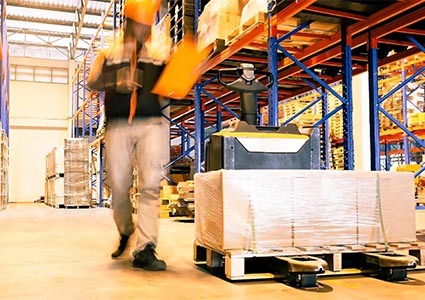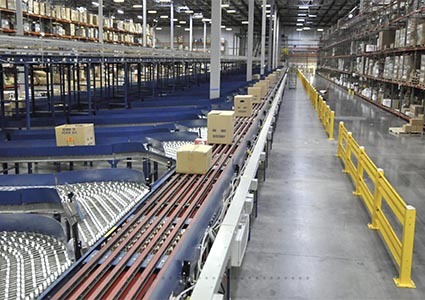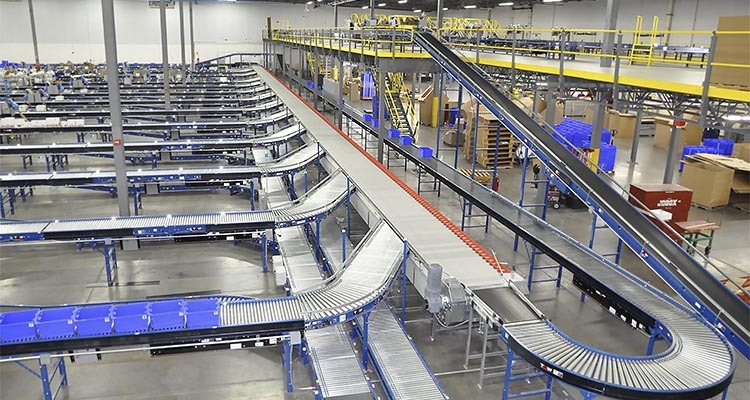Discover how ABCO Systems transformed warehouse storage from humble racks to sophisticated robots
As a leader in the warehouse automation industry, ABCO Systems LLC (ABCO) boasts over 30 years of experience helping clients implement the tools they need for their warehouses and distribution centers. From warehouse design to warehouse automation, ABCO delivers unique solutions tailored to meet each client’s needs, big or small. Though based in New Jersey, the company offers its services to businesses working in any industry or physical location, empowering them to make the most of their space and processes with automation solutions that fit their requirements. Thomas Hoff, Chief Sales Officer, uncovers the milestones that have shaped ABCO as we know it today.

“There have been numerous iterations of ABCO since its establishment by CEO Seth Weisberg’s grandfather in the early 1970s,” he begins. “Initially selling accessories to the garment industry in New York City, the company shifted its focus in the 1980s, when designers began storing their manufactured garments in New Jersey. To prevent their garments being wrinkled before distribution, designers used garment on hangar (GOH) racking systems. Noticing this trend, ABCO started supplying very rudimentary GOH racking systems throughout the decade. However, in the early 1990s, the rise of flat-pack storage led to increased demand for static storage solutions. In the early 2000s, the business became a provider for companies’ warehousing, distribution and e-commerce needs, with a specific focus on moving product quicker. To that end, ABCO ventured into conveyor systems, hiring other companies to help them design the system and resell it, thus acting as a middleman to deliver that solution. This decade also marked my entry into ABCO, to whom I had previously been selling static storage.”
Embracing automation
When Seth joined ABCO, he was meant to temporarily replace his father following a heart attack. Nonetheless, he stayed on board even after his father’s return, working collaboratively to grow the business. Upon his father’s retirement, Seth took over the company and hired a conveyor engineer named Matt Lobriato, who now works for ABCO as its Chief Engineering Officer. “Shortly thereafter, we moved to a much bigger building with roughly 5000 square feet where we stayed for a couple of years. Subsequently, we moved to a new facility spanning 10,000 square feet, and then to another one of 35,000 square feet. From there, ABCO has been on an upward trajectory. In 2020, the ZAF Group acquired 70 percent of the company. This change propelled our growth, allowing us to settle into our current facility, which spans about 30,000 square feet. Additionally, we changed our business model from providing used and new solutions to new only. Moreover, we have turned our facility into a showroom to educate our customers on solutions such as robots, various types of storage, automated storage and retrieval systems (ASRS), and more,” he adds.
Having worked under Seth’s leadership since he first joined ABCO, Thomas is eager to discuss the company culture fostered by its CEO. “I tell everybody that

working for ABCO was the best decision of my life. In typical corporate America, a lot of people go to work with a pit in their stomach, dreading the day ahead. However, the culture that has been generated at ABCO doesn’t allow for that. Indeed, we hold weekly meetings with everybody at ABCO, where we discuss all our mistakes as we strive to take responsibility for everything in our sphere of influence. Instead of lecturing our employees, we celebrate their mistakes and find solutions not to let them happen again. I believe that by learning from our mistakes and addressing them in a positive way, we foster a happy work environment. The ABCO team is very close-knit, and these meetings instil a sense of camaraderie into all of us, making us want to go the extra mile,” he enlightens.
Moving forward, Thomas discusses the implementation of automation both within ABCO’s operations and the wider industry. “When we think about automation, conveyor systems are what comes to mind first. Whilst conveyance has existed for over 140 years, we must still explore other types of automated solutions that may be more suitable in certain applications. ABCO considers automation on a case-by-case basis, but there are some leading factors that make me question the convenience of conveyance. For instance, the lease term on a facility is a major consideration, as conveyance is a fixed automation which would be exceedingly costly to move from one facility to another if that lease ends. In contrast, automation like robotics allows for greater flexibility. Whether we are looking to move or expand, we would only have to load a few robots onto a trailer, do a little reprogramming and we’d be ready for business in a couple of days. Moreover, conveyance can prove very expensive down the road for the end user. Another shift in automation trends occurred with the boom of e-commerce, which has caused the landscape of warehousing and distribution to evolve drastically. To cope with the demand, we have moved away from hiring individuals to manual pick up orders to automation, thus reskilling these employees for more efficient, comfortable, and higher-paying roles. By leveraging automation, notably conveyor lines, crane and elevator systems, we not only optimize our operations but also improve our working environment,” he elaborates.
As our interview nears its end, Thomas shares ABCO’s vision for the remainder of the year. “Earlier this year, we purchased FastFetch Technologies, which has two core product lines. The first is a suite of pick/put to light solutions that fit any size operation. These solutions utilize genetic algorithms to improve pick productivity which is typically over 50 percent of warehouse labor. The second product line, IntelliPack, is geared towards minimizing the box size used in packing to save companies on corrugate, dunnage and dimensional shipping costs. For the rest of the year, ABCO will focus on expanding this product line, aiming to make automation accessible to a broader customer base, including entry level companies. Crucially, we have been able to offer less than a year return on investment on our automated solutions, which is unheard of,” he ends.
Through a culture of learning and expertise in automation, ABCO is well-equipped to continue empowering businesses to make the most of their space with cutting-edge solutions.
